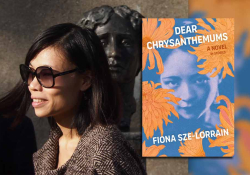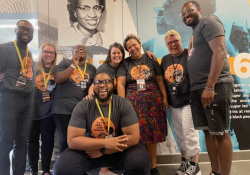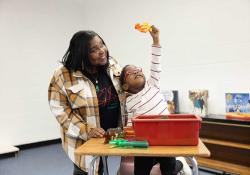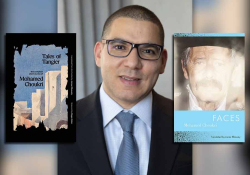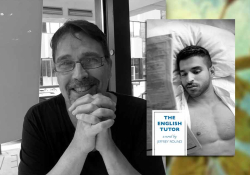Thoughts on Bad News in Children’s Lit and Buzz Lightyear: A Conversation with Chad Reynolds and Hanan Awad
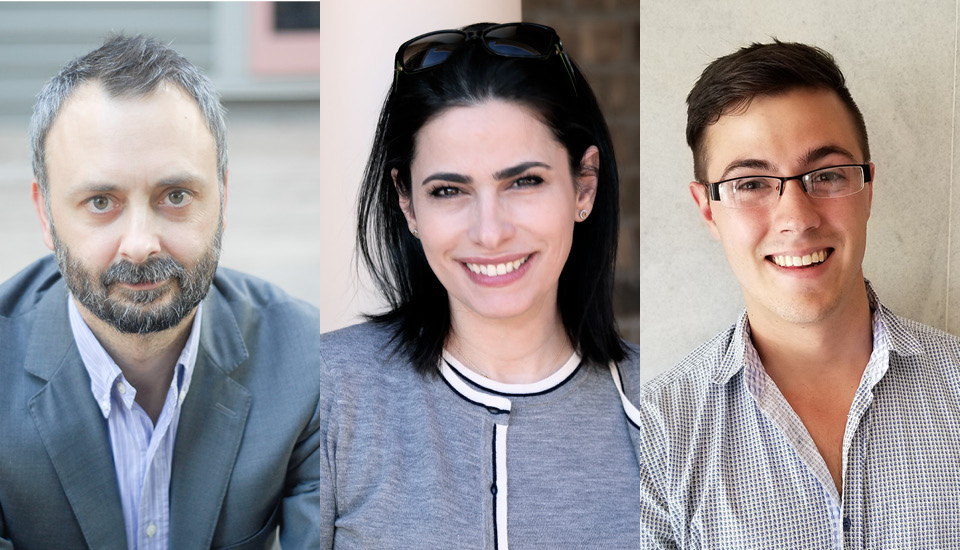
World Literature Today intern Reid Bartholomew sat down with Chad Reynolds, one of the co-founders of children’s lit publisher Penny Candy Books, and Hanan Awad, a Palestinian American street photographer as well as the translator of Penny Candy’s newest release, The Blue Pool of Questions.
“In fact, that’s your head, the row right above me.” Hanan leaned in to follow Chad’s finger pointing to a picture taken on his phone on the day they first met. Seeing them now, sitting next to each other in a tan leather corner booth of a tidy Thai restaurant, it’s hard to imagine that the two have only known each other for a little over a year.
The two didn’t meet through a conference or any other professional venue. They simply happened to be in the same Unitarian church on the same day. Hanan’s older son, Muhammad, was asked to play the oud during service that day. Chad was so struck by the performance that he introduced himself to the family. “Next thing you know,” he said, “we’re talking about Penny Candy Books.”
“I believe that everything happens for a reason,” Hanan agreed.
This chance encounter led to the English debut of The Blue Pool of Questions, a beautiful book with ethereal artwork. In it, the protagonist comes to a new town where the people are not fond of his eccentricities and endless questions. As the title suggests, it’s the kind of book that pushes children to ask questions about the world around them, to never take anything for granted. As Chad put it: “This book is important in that it asks kids to think for themselves.”
But, for Hanan and Chad, this book isn’t just for kids. “We use it as an excuse for the parents to read it,” Hanan explained, as plates of steaming food were set down in front of us.
“It’s really about raising the child,” Chad added, pulling his silverware from his napkin. “As all good children’s books do, I think they teach the parents to be better parents.” He compared parents to the townspeople in the book; they are both faced with someone in their lives who cannot help but ask questions about what most of us take for granted as the most obvious of subjects, and often they don’t make much sense. “Being a kid is scary. You don’t have much power. People tell you what to do, and sometimes those rules seem arbitrary, and they don’t make a lot of sense, and I think this book is going to be something that helps parents remember that about their children.”
“I have to say that I learn so much from my kids. I haven’t told you about the Halloween costume, have I?” Here, Hanan breaks into a wry smile.
Hanan has always liked pirates, and when her older son Muhammad was in first grade, she wanted to dress him up as one for Halloween. Muhammad was apparently less than thrilled, but she went ahead and bought it anyway: “the vest, the belt, the hat, all of it,” she said. Two nights before Halloween, she found Muhammad in bed, crying. “I’m going to be a pirate,” he told her, “but I don’t want to be a pirate. You want me to be a pirate.” Here, Hanan paused, as if reliving the feeling of having that mirror turned back onto herself.
The next day, the two of them went out to buy a Buzz Lightyear costume.
“And I can’t stand Buzz Lightyear,” she pointed out, “[but,] I thought to myself, Who is wearing the costume? Me, or him?”
Chad nodded. “Sometimes we need children to show us the way.” He points to two examples, the story of Moses’ son in the Bible and The Odyssey. In the Bible, Moses’ son is the one who completes his father’s journey to the Holy Land, and in The Odyssey, Odysseus’ son Telemachus is the one who abates his father’s wrath. Here, I noticed a parallel to the creation of The Blue Pool of Questions; had Muhammad not played the oud in church a year ago, then the book wouldn’t have been published. Once again, a child leads the way.
Throughout our conversation, I had a number nagging me in the back of my mind: 3 percent, roughly the percentage of books published in translation in America. I was curious as to how this dynamic played out in the realm of children’s literature.
“That’s a good question.” Chad responded. “Let me chew my chicken real quick, because I’m armed with some statistics.” As he swallowed his mouthful and moved around what was left on his plate, I noticed Chad’s sunny demeanor start to fade.
He pointed out that a number of countries are developing into first-tier powers with growing middle classes, which means more disposable income, which means more content created and consumed. With current consumption habits, those of us in the United States are missing out on a lot of the topics in global conversation.
“It shows a provincial attitude that is incommensurate to our position as a preeminent world power,”
Breath.
“Or maybe it’s reflective of the fact that we think we’re the best, and that we don’t need any of the world’s voices. But, if we were truly great, we would be great listeners.” Improving this listening aspect is one of the pieces at the core of what Penny Candy Books hopes to do, starting from the bottom and working up.
If the children are our best hope for changing the world, how do you speak to them directly without their parents getting in the way?
“If the children are our best hope for changing the world, how do you speak to them directly without their parents getting in the way?” Chad went on to tell the story of when he met with a branch of the Rotary Club to talk about Penny Candy Books and The Blue Pool of Questions. “One guy raised his hand in the end and said, ‘Are there processes you have in place to prevent yourself from publishing ISIS propaganda material?’”
Hanan’s mouth fell open, letting out a defeated “whoa.”
“If that guy walked into a store, would he buy The Blue Pool of Questions for his grandkids? Probably not.” I could perfectly picture Chad staring back at the man and doing his best to hide the disbelief on his face beneath a polite professionalism. Chad and the other co-owner, Alexis Orgera, vet every submission, and in his words, “We’re not stupid.” They have a vision for what they want to publish, for the voices they want to place on stage, and that doesn’t include propaganda.
“But we are going to publish something that’s unpatriotic,” Chad noted, “if your version of patriotism is xenophobia, if your version of patriotism is misogyny or racism or close-mindedness. So in that sense we are dangerous. What we are challenging is a narrow definition of what it means to be an American.”
This has been a prescient issue for Hanan. The anniversary of 9/11 had recently passed, and she expressed her frustration with the comments that her children received in school that day. “What do I have to do with it? Is it because of my name, my skin, my belief? What does Hamza [her second son] have to do with 9/11? He’s such an American kid who goes to school like everyone else.”
“Born in America.” Chad added.
“Yeah, it gives you this identity crisis, where you don’t know where you belong. What is it to be an American? White and Christian?”
Chad continued along Hanan’s train of thought: “I think if you’re a white male, and you believe that there was a punitive greatness in this country at one point, you hearken back to those times when you held all the power and all the say. You conveniently ignore the other voices that have always been contributing to this country’s greatness. . . . It is disappointing that we’re still figuring out that it’s not all about white people in this country. I mean, it’s disappointing that white people are still insisting so.”
To combat this, Chad makes sure that Penny Candy Books publishes books that search for identity within and among the multiplicity of narratives that comprise America. “I think that the books we publish, each in its own way, are like the man with the blue hair: they’re going to ask questions that put the onus on people to be big about it, fair about it, to listen.”
The waitress came by and picked up some of our plates, leaving us to sift through the ideas passed around the table in the relative silence of the buzz of conversation around us and the clacking of plates. Once the table was cleared and the waitress received a round of “thank-yous,” I asked them what children’s literature they thought desperately needed to be translated into English.
The dearth of translation in the US made it a difficult question for Chad. “It’s hard for me to point at any one writer, because there are so many voices that I’m not even aware of that need to be translated.” He did, however, recommend someone who already has been translated, a cartoonist from Japan named Shinsuke Yoshitake for anyone with kids just itching to puzzle over questions.
For them to hear another voice, even if it’s a sad one, I think their lives will change.
“Mine are really sad,” Hanan followed up. “We need books of war, of kids in war from the Middle East, from Africa, from any place where there is war or refugees. We hear them in Palestine. We have so many books that deal with the uprising, the segregation wall, revolt, so many. It’s the norm for kids to read. For a child born and raised in the US, this [kind of] book will be a revolution.” To her, if an American child is able to see and read stories about someone just like them who lost their parents in war, or doesn’t get to go to school because it isn’t safe, that opens the door to an empathy that can bring about true change in the way the US relates to other countries. “If I speak Arabic now to these kids, they’ll remember it down the line and think ‘it didn’t sound so scary.’ For them to hear another voice, even if it’s a sad one, I think their lives will change.”
“I think Children’s literature has a proud tradition of delivering bad news to kids.” Chad remarked, pointing to Grimm’s Fairy Tales, and I couldn’t help but think of the way that we have watered down those stories to be more palatable to children. The truth is, the world is scary sometimes, but we can become stuck in the trap of constantly trying to pretend that it isn’t. If, as Hanan and Chad say, we need to give children more credit, then are we doing them a disservice by tiptoeing around heavy topics such as death and war?
In the end, we came back to the idea that it has to be the children that lead us into the future. Chad brought up a book that reminds him of our current situation called How the Children Stopped the Wars by Jan Wahl. In it, a young boy gathers up a crew of children who set out to stop the terrible war being fought by their parents.
“It’s humbling when your child comes and tells you you’re wrong, and you know that you are.”
“When your child says I don’t want to be a pirate, I want to be Buzz Lightyear.”
“No, Buzz Lightyear is not beautiful. . . . But Muhammad was happy.”
October 2017
For book suggestions and further reading on the subject of international children’s literature, follow these links:
Chad Reynolds is the co-owner of Penny Candy Books, an independent children's book press dedicated to publishing books that reflect the diverse realities of the world we live in, both at home and abroad. He is also the co-founder of Short Order Poems. He lives in Oklahoma City with his wife and two sons.
Hanan Awad, known to most as Debwania, is a Palestinian-American living in Edmond, Oklahoma. Debwania is an established street photographer. She received her undergraduate degree in Middle Eastern Studies from Rutgers University, a filmmaking certificate from New York Film Academy, where she also studied photography, and is completing her Masters in History at University of Central Oklahoma with a focus on Latin America and the Middle East.

